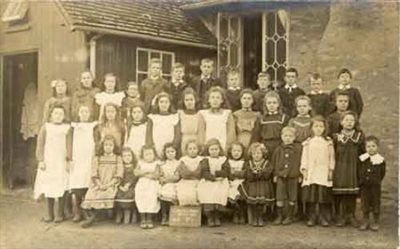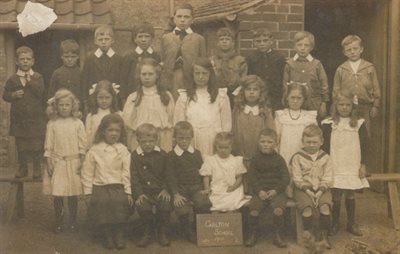Carlton School 1901 to 1919
This page was contributed by Pamela Hider
School Logbooks 1901-1919
The information below is taken from the logbooks for Carlton School for 1901-1919. Logbooks from the 19th and 20th centuries give us a fascinating account of life at schools from the beginning of our national education system and of how education evolved throughout its first hundred years, particularly in a rural setting such as Carlton. They also reflect the many changes in society that took place during that time such as hardship, disease and world wars, through to population growth, the affluent society, a National Health Service, technology and vast opportunities. Access to the logbooks was provided courtesy of the Headteacher of Carlton Primary School.
In September 1901, Henry A. Clarke commenced duties as Master, with his wife Mary as Assistant Mistress in the Infants and their son, John, aged 14, as Monitor. Originally from Yorkshire & Lancashire respectively, Mr. & Mrs. Clarke brought their four sons with them from Hampshire, where Henry had been a Master and Mary had been Assistant Mistress. A daughter was born in Carlton. The Clarkes tenure proved not to be an easy one.
Mr. Clarke 'had the reputation of being a very strict disciplinarian'. An account from an old Carltonian who was a pupil during this time tells of the caning of his elder brother who had just graduated from the Infants to the Senior classroom (Z1521/1/1/11). The logbooks begin with Mr. Clarke's first impressions: 'the school (is) in a very backward condition throughout … The children do not seem at all intelligent … seem very lethargic'. When eight children were admitted from other schools in June 1904, he wrote 'They are all very backward and have had a demoralizing influence on the work of the school'. In 1906, he recorded that having eleven children under five was 'a hindrance'. Other negative comments about the children continued to be recorded, culminating In Sept. 1914 when he wrote of the attainments of new children as 'much below mediocrity'. In his quest for discipline, he also had disputes with parents eg. when he sent boys home for lateness, he alienated their parents. He was threatened by a parent with punishment himself if he punished his boy.
There were also staffing problems. Teachers came and went; Mrs. Clarke was absent due to 'confinement'; staff were absent for very many weeks due to illness, some not returning at all; teenage children had to be recruited as Monitors (including another Clarke son); Mr. Clarke sometimes was the only teacher in the Main Room of 50 - 60 children.
Lack of heating
The stove mentioned in the Surveyor’s report of 1904 had been installed in the infants’ classroom in 1886. Described in the report as being in a 'fair condition', it had already begun to cause problems the previous year. Mr.Clarke wrote in February 1903 'Infant Room without fire today. This, in addition to the draught from the window makes the room, to say the least of it, uncomfortably cold. The stove could not be lighted, as the wind was wrong, and the flames came out at the bottom when the stove was lighted'. In January 1904, 'the stove in the Infants Room could not be lighted as it smoked so badly'. In February 1904 'No fire in the Infants Room owing to the stove smoking. This room is very draughty, the window fittings being neither air tight nor water tight. The same, as regards draughts applies to the doors and windows of Main Room, causing the children to suffer from Neuralgia and Colds'. A week later 'The Main Room was full of smoke most of today making it very uncomfortable. No fire in the Infants' Room on the same day as it would not draw'. There are numerous such entries over the following years with Winter temperatures in the classrooms being recorded with fire between 40° - 45° F (4° - 7° C). In the war years, with no coal in the village, it sank to 36° F (2° C). No wonder so many children were off with colds, sore throats and flu (also staff) in addition to the very many childhood illnesses of the day. No wonder either that parents wanted to keep their children at home, especially when some of the Infants were three years old. It was to be fifty more years before a new stove was fitted.
Possibly as a result of the Surveyor's report of 1904, improvements started to be made, as in March 1906 'workmen are engaged round the building. Interferes with Drill and otherwise inconveniences the work of the school'. An extra week's Easter break for 'proposed alterations in school premises' was followed by four more weeks of school closure due to a measles epidemic.

Carlton and Chellington School Group 1907 [Z1306/25/6]
Inspectors' Reports
The early reports were 'satisfactory' or 'fairly good', improvements being 'creditable to the Master'. No reports were recorded after 1903 until 1907 when there was 'room for further intelligent instruction' and the comment made that there was a lack of suitable reading books. Space in the Infants was so limited that the Inspector suggested children under 5 shouldn't be admitted. Reports of 1910 & 1912 both began by saying there had been little change since the last report. In 1910 'Infants' attainments should be higher and methods of instruction more intelligent and interesting'. The cold classrooms were 'still most unsatisfactory' and the Inspector stated his aim 'to inquire what steps will be taken to improve the warming of this school. Considering all the depressing circumstances under which this school is conducted, this Report is not so unfavourable to the instruction which is given there as at first sight would appear'. But no improvements were forthcoming and in 1912 'The accommodation provided for the Infants is very far from satisfactory'.In June 1912, the Director of Education and the County Surveyor of Schools made a visit as regards the heating. In 1914, once again there were 'workmen round the building', but (as in 1904), it was not recorded what was done - certainly it wasn't to improve the heating.
No more Inspectors' reports were recorded after 1912 under Mr. Clarke's tenure, although Inspections were carried out and dates noted. Diocesan reports however had been carried out annually since 1878 and were always at least 'good' and at best 'excellent' (especially singing). Like Mr. Simpson, Mr. Clarke also played the organ in church. In 1902 he accompanied the choir to a Choral Festival at Sharnbrook and they attended the Choral Festival at Turvey every year. An entry in May 1912 recorded that absence was due 'to local custom of going about the village singing May Day songs to get money'. The children obviously loved singing.

Carlton School 1913 (courtesy of Carlton & Chellington Historical Society)
1914-1918
These proved to be very difficult years indeed, especially the Winters. They were marred by illness, very bad weather, smoke filled classrooms with icy temperatures, staff shortages and several school closures of many weeks because of epidemics. Also, owing to a new regulation in January 1915, boys over 12 were now eligible for farm work which led to their continuous absence which reduced attendance figures further. In January 1916 it was recorded that 'Children are illegally employed in Farm work'.
Since 1905, Mr. Clarke had suffered with asthma and bronchitis and had had absences himself as a result. On March 25th 1915, he wrote 'The chimney smokes very badly this morning. The room is scarcely fit to be occupied, especially with the Epidemic of coughing prevalent just now. I called attention to this, in accordance with H.M.I.'s wish, at his last visit' and he adds somewhat despairingly 'I have made entries in the Log Book for the last 14 Winters'. Attendance figures were now very low eg. 33 in December and 29 the following March. The effect of the War was felt as the Attendance Officer himself didn't visit for 10 months as he was on a Volunteer Reserve list. Materials requested were repeatedly denied and 'no exercise books or drawing books can be supplied'. Mr. Clarke's absences were now becoming very frequent and long lasting. In July 1916, it was stated that 'The Master has during the whole of the last 2 weeks been unfit for Duty owing to illness, but in school'. More children's illnesses leading to further poor attendance continued into 1917. Mrs. Clarke also had had several absences during the last year due to ill health. More requested materials were struck off the list and there was a scarcity of paper. The situation had indeed become very bleak, but worse was to come: in 1918 Mr. Clarke travelled to Sheffield to see his dying sister; there was very little coal in the village so fires couldn't be lit even at home; scarlet fever was rampant; staff left; and in May, Mrs. Clarke resigned on the advice of her doctor, due to 'deafness and nervous strain'. In October, with children having to wear coats in school, there was a flu epidemic and attendance sank to 8. The school closed for four weeks.
1919
In January the 'Master not in a fit state to work vigorously'. In February he was absent for one week (in Manchester) owing to the loss of his eldest son (John, who had been school Monitor in 1901). Restrictions still applied as regards materials. Mr. Clarke's health deteriorated further, so that by May, 'Master ill but in school to avoid closure'. Finally he could go on no longer and resigned in July with effect from October. He had given the school 18 years service of a 40 year career.